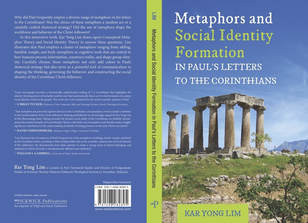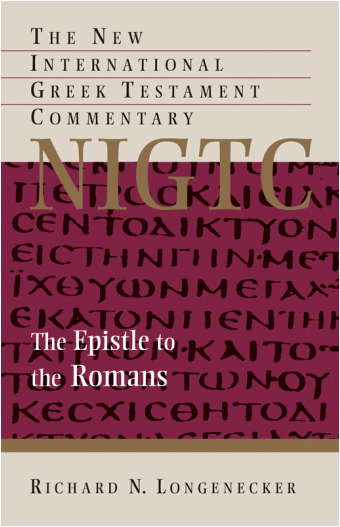What about your list?
|
My extended no-pay leave from the seminary has begun, and this gives me a bit of freedom to catch up with some reading. Here is a list of books I will be reading and engaging with in the months to come.
What about your list?
0 Comments
A group of Malaysian scholars currently in Malaysia and other parts of the world come together to contribute to a book project entitled, "From Malaysia to the Ends of the Earth: Southeast Asian and Diasporic Contributions to Biblical and Theological Studies." This volume is edited by my colleague, Elaine Wei-Fun Goh, and others including Kah-Jin Jeffrey Kuan, Jonathan Yun-Ka Tan, and Amos Wai-Ming Yong. This project is now in the final proof reading stage and should be published by Claremont Press in the autumn of 2021. I make a small contribution to this project where I examine Paul's understanding of ethnic relations between Jews and Gentiles gleaned from his letters, and offer some contemporary reflections for nation building in Malaysia.
My essay is entitled, "“For All of You Are One in Christ Jesus” (Gal 3:28): Paul’s Social Vision Beyond Inclusivity and Diversity", in pages 83-116. This bulk of the essay was written when I was on sabbatical in the second half of 2019. In light of the current political climate and the COVID-19 pandemic, I have made further reflections on what I have written. Perhaps a short follow-up piece might be needed. I look forward to seeing this significant project in print soon.
While it may not be possible to visit all these places in Turkey physically with our borders still closed, you can join me in a virtual tour as we follow the footsteps of Paul in Turkey, read the Scriptures in sites where the events took place, and reflect on some of the lessons we can apply in our context today. Please register for the course by clicking on this link: https://forms.gle/8kvpWNyJBzMwcoHz9 Take a sneak peak of what we will cover in our sessions by viewing the slideshow below. This event is organised by Footprint Travel Planner and Beit Shalom.
Finally, Porter believes that my book "will undoubtedly provoke further investigation of metaphor use in identity formation in the Corinthian correspondence and elsewhere. This work is a valuable resource for anyone considering the social-scientific analysis of metaphors and their use in the Corinthian correspondence." Overall, the review by Porter on my work is generous and encouraging, his critique on the weaknesses of the book is fair and courteous, and his comment on my methodological framework for analysis on metaphor is positive and welcoming. Please click on the file below to read the review.
 I am very pleased to inform that all copies of my recent publication (Metaphors and Social Identity Formation in Paul's Letters to the Corinthians) that are in my stock have all been sold. I would like to thank everyone in Malaysia for your continuous support for my work and ministry. For those who are still interested to purchase the book, please click here for options of how to order the book. I will not be holding anymore stock in future. My other publication, Jesus the Storyteller: Hearing the Parables Afresh Today, is still available at RM45 per copy. Please get in touch with me if you are keen on purchasing this book. The cover design for my upcoming publication has been finalised by the publisher, Pickwick Publications. The book, Metaphors and Social Identity Formation in Paul’s Letters to the Corinthians, is due to be published in the middle of the year. I will provide further details of the book in the weeks to come.
I am very pleased that I am able to use a photograph that I took when I visited ancient Corinth in 2015 for the cover. Special thanks to Brian Tucker, Kathy Ehrensperger, and Bill Campbell for the blurbs. In the latest issue of Evangelical Review of Theology (Jan 2017, Vol 41/1) with a special theme on Economy and Marketplace, I contribute an essay on "Paul the Economist? Economic Principles in Pauline Literature with the Jerusalem Collection as a Test Case." This piece is an extension of my earlier essay, "Generosity from a Pauline Perspective," published in the same journal in the Jan 2013 Vol 31/1 issue. In this article, I examine why the Apostle Paul was deeply concerned with the inequality of income distribution in the Roman Empire and how this propelled him to care for the poor. By taking a closer look at Paul’s collection for the Jerusalem poor, there are a number of economic principles that guided him in his quest for remembering the poor: the principle of grace and generosity, the principle of equality, and the principle of sharing recourses as a family. All these principles were revolutionary in nature as they were against the prevailing social conventions of the Greco-Roman world. Paul used these principles to construct a new economic structure to achieve an equality of possessions through voluntary redistribution of wealth between persons of different classes – rich and poor; different geographical locations – Judea and the Mediterranean world; and of different ethnic groups – Jews and Gentiles. The rest of the essays in this issue include the following: Theology of Jubilee: Biblical, Social and Ethical Perspectives by Chris Wright I am very pleased to know that John Jefferson Davis, my former theology professor at Gordon-Conwell Theological Seminary also has an article in this issue. Apart from Davis, this issue also includes contribution from authors who originate from Asia, Africa, and Eastern Europe, apart from those who are from the developed nations - a truly global contribution indeed.
Theological Research Scheme (TRS) aims to assist Malaysian scholars by providing modest research grants towards their research and publication. In September this year, I signed a publishing contract with Wipf & Stock Publishers where I will be contributing an essay, “The Fellowship of Christ’s Suffering: Suffering and Identity Formation in Philippians,” to be included in a volume titled Suffering in Paul edited by Siu Fung Wu, an Australian New Testament scholar. Our theological institutions have somewhat limited resources where many specialised academic books are not available. These books are expensive (no thanks to the unfavourable exchange rate) and our financial resources are limited. Subscribing to digital access is beyond the means of our institutions. This means that our research may, at times, be frustrated because of limited access to books that are needed, unless we travel overseas to visit some of the better theological libraries. This is where TRS comes into the picture by providing the much needed research grants for scholars like us. The trustees of TRS approved my application for a grant to purchase a total of ten monographs on Philippians as seen in the photo above that are currently not available in our library. Upon the completion of my essay, all these books will be donated to the library of Seminari Theoloji Malaysia where I teach with the hope that these resources will be made available for other students, researchers, and the wider community. This is where TRS not only serves to help local scholars in their research and publication but also contributes to building up the modest resources we currently have.
Our long year-end vacation has just started. Until the next academic year begins in January, I will busy working on my essay for the next couple of months, and I hope to have a rough draft ready by the end of the year. Many thanks to TRS for their contribution, and to all the donors who have contributed to this scheme that makes my research possible. For more information on TRS, please visit their website by clicking here.  The long awaited commentary by Richard Longenecker on Romans under the NIGTC series is now finally published by Eerdmans. Longenecker earlier on in 2011 published a 500-page volume just on the introductory issues to Romans, and this has certainly heightened the expectation of the full commentary. I must say this is one commentary on Romans that is high on my anticipation list after learning much from Robert Jewett's massive commentary of the same book in the Hermeneia series. I will be making my order for the commentary soon and will be looking forward to interacting with Longenecker and also benefitting from his wisdom and insights on Romans. I am certain Longenecker's exegesis will challenge some of my own understanding and interpretation of Romans. Much of what I will learn from this commentary will certainly make its way to the course on Romans I will be offering at the Bible College of Malaysia later this year and at Seminari Theoloji Malaysia next year. As a teaser, Eerdmans publishes Longenecker's 6 major theses for Romans, and I have taken the liberty to reproduce the summary here below: Thesis 1 I think the 6 theses are enough to whet my appetite for now until I hold the commentary in my hands. I hope Amazon will not disappoint in the speed of delivery!
The next few weeks will be one of the most exciting seasons for Pauline studies. A number of significant books have been/will be published by senior scholars, reflecting the fruit of their labours. For those of us in Malaysia, we could only wish that Ringgit had not been heading south!
|
AuthorLecturer in New Testament Studies at Seminari Theoloji Malaysia. You can find out more about me by clicking here. BlogMy engagement in conversation with issues, reflections, and concerns related to my vocation as a seminary lecturer and theological education in general. Opinions expressed in this blog are strictly my personal views and do not represent the official position of the seminary Categories
All
Archives
November 2023
|
||||||||||||